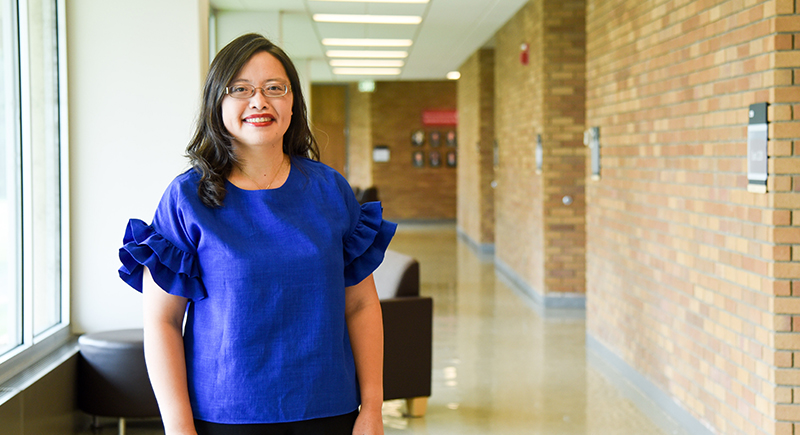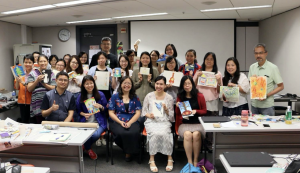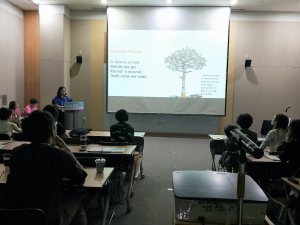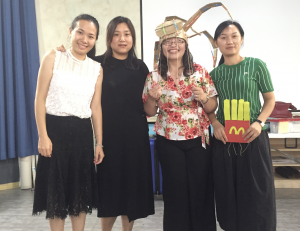
October 17, 2017 WSU Tri-Cities professor growing partnerships for arts education across the globe
By Maegan Murray, WSU Tri-Cities
RICHLAND, Wash. – Yichien Cooper, adjunct professor of teaching and learning at Washington State University Tri-Cities, is showing the world that arts education is more than the creation of physical and digital media through her work in growing international partnerships across the globe.

Yichien Cooper and teachers from STEAM workshop in Hong Kong
Cooper traveled to Asia this summer to create and build upon international partnerships in arts education where she presented at conferences and provided workshops in China, Hong Kong, Taiwan and Korea. During these presentations, she worked with arts educators and researchers from around the world, discussing ways to bridge gaps in arts education. She said instilling arts-based academic programming among STEM-based programming is critical to growing a students’ problem-solving and innovative ability.
“Art isn’t just art,” she said. “It is the confluence of ideas that come from many different experiences and knowledge that one obtains throughout their life. When applied to subjects like science and engineering, for example, that is when products and initiatives develop that continue to change the world.”
Leading by example
Cooper said many Asian nations are now trying to catch up on American standards for pairing the arts with technical and science-based academics. The United States, she said, began a focused philosophy to include arts with STEM fields, combining the old “STEM” acronym to make “STEAM.”
She said countries in Asia have witnessed the successes of companies ranging from Microsoft, to Apple, to scientific and medical firms that have

As an invited speaker for the 2017 InSEA World Congress, Cooper gave a talk on “Building A Sustainable Creative City through Art with Social Purposes: An Autoethnographic Account of Being an Arts Commissioner.” She talked about how one discovers identity and sense of self through the planning and development of public arts.
taken the world by storm by means of developing products and apparatuses that originated out of creative real-world problem-solving.
“What research has shown is that with the introduction of arts concepts among these technical fields, children thrive in their creative product development, their teamwork ability and their ability to think long-term to come up with creative solutions to real-world problems,” she said. “It’s a tool that is effective in bridging across curricular areas and improving learning.”
Cooper said other countries are emphasizing how arts can enrich students’ learning. With the popularity of STEAM education, they are looking up to what American students are able to accomplish through that creative process.
“They want to collaborate and implement those strategies within their own schools,” she said.
Presenting to countries across Asia
During her travels in Asia, Cooper gave a range of presentations focusing on how to incorporate the arts into various academic fields.
One of her presentations focused on integrating arts at Washington State University Tri-cities, providing highlights from her upcoming Chinese book, “The Power of Integration” which will be out in November in China. During another presentation, Cooper talked about her work partnering with local schools in the Tri-Cities to develop their arts programming in combination with STEM curriculum. Cooper also spoke about her journey as an art advocator in Richland at the 36th International Society for Education Through Art World Congress in Daegu, Korea..

Cooper (second from right) with some participants during her STEAM presentation in Foshan, China, where she conducted a three-day workshop on STEAM. The participants were asked to apply simple machinery in a craft design Displayed in the photos, participants showcase an octopus head dress where the wearer pulls strings to move all tentacles.
Cooper spoke to educators and individuals from various industries on improving visual literacy and research through data visualization. As the chair of the data visualization working group for the National Art Education Association Research Commission, she said it is important to create visual representations of information that is easy and accessible for all to understand and ingest, making it more accessible to the non-technical expert in that field.
Cooper also conducted hands-on workshops that were organized by the Art Education Research Institute in Taiwan, Art Education Training Center at Foshan in China, and the Hong Kong Society of Education in Art.
Further, Cooper used her experience abroad to build partnerships with local students overseas. She worked with teachers at Shang-Shi Elementary School in Taiwan, where both groups hope to partner to develop joint curriculum for arts education.
“We could have the students in Taiwan showing our American students what their art and arts curriculum looks like and our American students can share with them what art looks like in America,” she said. “Our ultimate challenge is the time difference, so we might go for a video-based route and exchange videos, as well as talk about each other’s daily life and how they are similar and different. Shang-Shi strives to provide global education to children’s life, being able to assist them finding opportunities for students only shows that we are living in a global village.”
Looking toward the future of arts education
As the Acting President of World Chinese Art Education Association, Cooper will organize the International Society for Education Through Art Asia Regional Congress in 2018 in Hong Kong with colleague Solan Wong, of the Education University of Hong Kong, and Kaitak Kwong, president of the Hong Kong Society of Education in Art.
Focusing on collaborative efforts to sustain greater arts education community, she said the conference aims to welcome groups from throughout Asia and south-east Asia. The congress will focus on the theme of “challenges and transformations,” or CT for short in connection to the type of body scan, and the goal will be to evaluate the next steps for arts education and embracing challenges within current educational systems.
“So many countries individually write their teaching standards, training standards and curriculum,” she said. “The fact that we can come together and work collaboratively and share ideas is a huge win for education. We all have a common goal that is focusing not only on the immediate results for our students, but the long-term value of their education. That is a good change.”
Cooper said it is true that many schools across the world have slowly began to narrow their scope on art, but through these types of international partnerships, arts associations around the globe hope that individuals will see the value and significance of arts in education, especially when combined with the traditional STEM fields.
“We need to make art visible,” she said. “Art brings people together. It transcends gender, age and physical boundaries and it’s an important part of a student’s education.”





